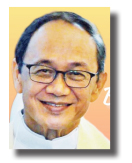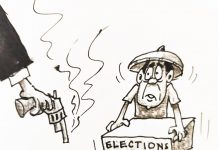
WE have to understand this point very well. We need to be truly poor so we can be truly rich in God, attaining the fullness of our dignity as God’s image and likeness, children of his, sharers of his divine life and nature. This is how we can be truly rich.
To be truly poor is to acknowledge that we depend on God for everything. To be truly poor is not about how much one has or does not have. That is a very poor description of what is to be truly poor. And that’s because one can have a lot of things and yet know that everything comes from God and is for God and for everybody else.
A truly poor person knows that he is not the absolute owner of whatever he has, even if he is entitled to the right of private ownership. He is at best only a steward tasked to make use of whatever he has to start building the kingdom of God here on earth. A truly poor person has an abiding awareness that he is only a caretaker of the goods of the earth and that he is answerable to God and to everyone for that duty.
In a certain sense, our earthly life can be described as a matter of emptying and filling. That is, emptying of our own selves, our own egos, so we can be filled with God, with love, which is what is proper to us.
In whatever we do, let’s see to it that this business of emptying and filling is the underlying law and principle that is being followed. Failing in that can only mean failing in our ultimate purpose in life, no matter how successful we may appear to be in our work or social and political life, and in the other aspects of life.
We need to adapt and develop the relevant attitude and skills so we can turn this ideal into a working lifestyle. We should not forget that Christ clearly said: ‘If anyone wishes to come after Me, he must deny himself, and take up his cross and follow Me.” (Mt 16,24) That, in a nutshell, is the biblical basis for this business of emptying and filling.
Christ himself, our way, truth and life, lived this principle perfectly by emptying himself so he can be filled with the will of his Father.
St. Paul expressed this fact in this way: “Christ who, though he was in the form of God, did not count equality with God a thing to be grasped, but emptied himself, taking the form of a servant, being born in the likeness of men. And being found in human form he humbled himself and became obedient unto death, even death on a cross.” (Phil 2,5-8)
Christ’s self-emptying cannot be overemphasized. Being the son of God with whom nothing is impossible, he chose to be born poor in a manger and led an austere life all throughout. Even in his impressive moments of preaching and making miracles, he did not want to be treated as a king or some kind of celebrity.
He preached about meekness and humility and lived what he preached. “Learn from me for I am meek and humble of heart,” he said. (Mt 11,29) In the Last Supper, he shocked his apostles when he began to wash their feet and insisted on doing so, despite the protestation of Peter, to give an example for them to follow.
We need to be truly poor to be truly rich in God!



